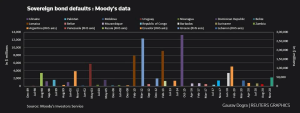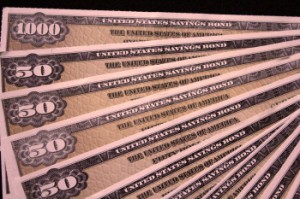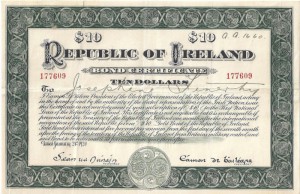As long as I can remember, the "boogeyman" of government debt has always been default. This is not an insignificant concern. Over the years, governments HAVE defaulted on their sovereign debt. In the 1700s, corporate debt was seen as more likely to be repaid than government debt. As recently as a year ago, Russia was facing the prospect of default on Eurobonds maturing in 2023 and 2043. According to the following chart by Reuters, 34 governments have defaulted on at least some of their sovereign debt since 1989. The largest defaults were Congo in 2012 and Ukraine in 2015, but there was also Ecuador, Nicaragua, Argentina, Venezuela, Russia, and Pakistan, along with many others. But … [Read more...]
Inflation and Bonds
What are Bonds? Bonds are a type of "debt instrument" frequently issued by corporations and governments. Typically they have a "par value" of 100 (or 1000). Par value, aka. "nominal value" is the face value of a bond. However, bonds can trade at a premium or discount to face value but at the end of its term, the borrower (i.e. government or corporation) must pay the lender (i.e. investor, aka. creditors or debtholders) the face value. During the term of the loan, the borrower makes interest payments to the lender based on the face value and the listed interest rate (aka. coupon rate). Bonds can be issues for fairly long terms i.e. 20 or 30 years so interest rates can change drastically … [Read more...]
Effect of Inflation on Bonds Part 2
Effect of Inflation on Bonds While inflation has hardly taken center stage among our economic woes of late, there are some credible voices in economics who are already warning of its dangers down the road. Since the FED has already locked itself into rock-bottom interest rates for the foreseeable future, if the economy does not surprise us with a great rebound in the next few years the Fed will have to resort to its one remaining tool, i.e. an expansionary monetary policy, adopting more aggressive quantitative easing, debt monetizing, and other stimulating (but also inflationary) measures. In short, the FED will have to print more money. At that time, the threat of inflation will be real … [Read more...]
The Effects of Tapering Off the FED’s Stimulus Program
Here's an economic irony for you. Less inflation means lower prices for you and I. However, to some who work for the Federal Reserve, that means things are off target and the economy still needs more work. Huh? What? It seems slightly fuzzy, but when you look at the larger macro-economic picture, things slowly start to come into focus. To a certain extent, inflation is actually good for the economy. The slow growth of inflation is one of many variables that is prompting speculation about whether or not the Federal Reserve should start tapering back its quantitative easing (stimulus) of the economy. Recent Inflation Drop Prompts Speculation In the May 2013 release of the April data, the … [Read more...]
What are Derivatives and How do they Work?
Derivatives Defined According to Dictionary.com the term "derivative" means 1. derived. or 2. not original; secondary. In the financial arena derivatives are derived from a basic commodity and can be a portion of that original commodity. They are essentially contracts between two or more people. You can think of derivatives as ways of "slicing and dicing" financial contracts. For instance, a normal bond could be broken into two parts. The first part would be the underlying asset itself and any appreciation thereon. The second part could be all the interest due on that bond. This way one investor would get more leverage on the appreciation of the bond while the other investor would … [Read more...]
The Impact of Inflation on Savings
The obvious impact of inflation on your savings is that the purchasing power is erroded. This means that if you stash $100 under the mattress today and inflation is 3% per year when you come back a year from now your $100 will buy 3% less stuff. Put another way you would need $103 to buy the same amount of goods a year later. When you extend this to 10 years you might think that it would mean that you would need $130 to buy the same amount of goods but because of the effects of compounding you would actually need $134.39. You can use the Retirement Planning Calculator to calculate the impact of inflation on your savings. As time goes on the impact of "only" 3% inflation compounds making … [Read more...]
Worried About Inflation – Consider Inflation Indexed Bonds
Inflation-Indexed Bonds (aka i-Bond)- Although inflation is currently low it is still a key concern for investors, because with interest rates at record lows and the FED promising to keep them there for the foreseeable future even a small uptick in inflation can prevent an investor from achieving a real return on investment, as returns on investment fail to beat inflation rates. If a return on investment fails to beat inflation, then in real terms you have not earned any money. You may have a larger figure for your total net worth, but in terms of purchasing power this will earn you less as the costs of living increased at a higher rate. On target Inflation is currently tracking at … [Read more...]
What are Treasury Inflation Protected Securities (TIPS)?
As the Government continues to flood the economy with new money via QE1, QE2, Operation Twist and now Twist2, many investors are fearing a massive inflation may be just around the corner. And so they are looking for a sfe haven to protect their investments from the deluge they see coming. Therefore they are turning to Treasury Inflation Protected Securities, or "TIPS". TIPS are considered an extremely low-risk investment as they have Government backing, are protected from the ravages of inflation and are less volatile than bonds and safer than stocks. How Treasury Inflation Protected Securities (TIPS) Protect Against inflation Over time even small levels of inflation can make a big … [Read more...]
Impact of Inflation on Bonds Part 2
This page has moved. If you are not redirected shortly please click here. … [Read more...]
Impact of Inflation on Bonds Part 1
Impact of Inflation on Bonds Bonds are often considered a risk-free (or nearly risk-free) investment suitable for "widows and orphans". While they are generally safe, they have several weaknesses in the modern marketplace, inflation, rising interest rates and default risk. Before buying a bond, make sure you understand how bonds work and how inflation can have an effect on bonds. The Nature of Inflation Inflation is often described as the general rise of prices in the economy. However, the increase in prices is merely the effect, called "price inflation." Monetary inflation, which is the expansion of credit in the financial markets, is what often (but not always) drives price inflation. … [Read more...]










